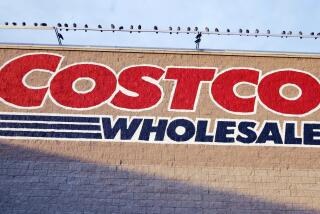Question on Payday: Paper or Plastic?
- Share via
Visa USA and four major banks took direct aim at the check-cashing industry Tuesday by rolling out a prepaid card that can replace paychecks for workers who don’t have bank accounts.
Employers can “deposit” employee wages onto the cards, and workers can then use the plastic to withdraw cash at automated teller machines, pay for purchases at stores that accept Visa credit cards and even pay certain bills, said Nizam Antoo, Visa’s product manager for the card.
Other banks have introduced similar payroll cards in recent months, but Visa’s product is the first to be backed by several of the nation’s biggest banks, including Bank of America Corp., Bank One Corp., FleetBoston Financial Corp. and U.S. Bancorp.
The announcement was cautiously applauded by consumer advocates who have been sharply critical of the growing check-cashing industry, which has more than tripled since 1995 to a $60-billion business. Check-cashing outlets, which proliferate in urban neighborhoods, typically charge 2% to 3% of a check’s face value and are increasingly used by the 10% to 20% of the U.S. population that doesn’t use banks.
“Anything that helps move people into the banking system is a good thing,” said Gail Hillebrand, an attorney with Consumers Union in San Francisco. “What you don’t want is for people to get stuck at this step.”
Financially, however, banks could be better off promoting the cards rather than trying to induce the so-called unbanked to open checking accounts, analysts said.
Check fraud and bounced checks cost banks billions each year, but payroll-card users will be unable to spend more than the amounts their employers load onto the card.
“We expect to pick up a lot of deposit accounts we would not otherwise pick up . . . and they don’t carry the same risk,” said Jim Geeslin, spokesman for Minneapolis-based U.S. Bancorp, which plans to launch the cards with a fast-food employer next month.
U.S. Bancorp will charge each employee user a monthly account fee of “less than $2”--lower than the bank’s lowest-fee checking accounts, Geeslin said.
Users must pay surcharges for using other banks’ ATMs, although they will be able to use U.S. Bancorp’s ATMs for free, Geeslin said.
Promoters say workers will have a choice whether to use the card or continue receiving traditional paychecks. Workers whose cards are lost or stolen will be able to get replacements and reimbursement under Visa’s “zero liability” policy, said Todd Brockman, Visa’s vice president of prepaid consumer products.
The card also will reduce costs for employers and banks by reducing the need to produce and distribute paychecks, Brockman said. Costs for workers should be less than using a check casher, although each bank will set its own fee policies for using the cards, Brockman said.
Promoters hope to tap a huge market. A Federal Reserve study last year showed that 10% of the nation’s households don’t have bank accounts, often because they don’t have enough money, can’t afford the fees or don’t trust banks. The American Bankers Assn. believes the figure is closer to 20% and includes as many as 15 million households.
Some banks, including Wells Fargo & Co. and Union Bank of California, responded to the inroads made by check cashers by purchasing check-cashing outlets.
The check-cashing operation partly owned by Wells, InnoVentry Corp., said it welcomed increasing competition from banks.
“This shows a recognition by the major players in the industry that there are a lot of consumers out there who are looking for an alternative to traditional bank accounts,” said Gil Roeder, spokesman for San Francisco-based InnoVentry, which operates 1,350 automated check-cashing kiosks nationwide.
More to Read
Inside the business of entertainment
The Wide Shot brings you news, analysis and insights on everything from streaming wars to production — and what it all means for the future.
You may occasionally receive promotional content from the Los Angeles Times.










